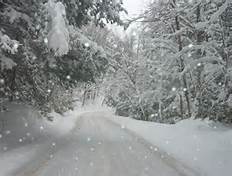
It is all too familiar by now; another potentially dangerous winter storm is headed our way! Seems to be the unfortunate trend this winter! Reality is, no storm should be taken lightly, but when should we prepare? What should we do to prepare for the potential danger that comes along with these storms?
First, it’s important to know what the winter weather alerts frequently issued in our area mean.
Winter Storm Advisory: Winter weather conditions are expected. Conditions may be hazardous and inconvenient. Caution should be used to prevent dangerous situations.
Winter Storm Watch: A winter storm is likely to occur. If you are in the watch area, you should stay informed and begin preparations.
Winter Storm Warning: Winter storm conditions have entered the area and are headed your way. Take precautions immediately!
In preparation of a dangerous winter storm, follow these safety tips to protect yourself and your family:
1. Prepare an emergency kit.
Include items such as:
· Flashlights
· Portable cell phone charger
· Battery operated radio
· Bottled water
· Non-perishable, easy to prepare food
· Extra batteries
· First aid kit
· Any necessary medications
· Warm clothing and blankets
· Emergency contact information
· Personal hygiene and sanitation items
2. Avoid driving during dangerous conditions. This may put you and your family in additional danger. Staying off the roads also helps road crews and emergency workers do their jobs!
3. NEVER use gasoline, propane, natural gas, or charcoal devices inside your home. These items include grills, generators, or camp stoves. Always be sure these items are outside in well ventilated areas to ensure carbon monoxide does not enter your home.
4. Protect your pets. Pets should be closely monitored while outside in severe or extremely cold weather. If possible, bring pets indoors until the danger passes. If that is not possible, be sure they have access to non frozen drinking water and a warmer area to reside.
5. Create a family emergency plan. Be sure children and family members know what to do in the event of an emergency. Children should be aware of what to do if a power loss occurs. Emergency numbers should be readily available to children and family members.
6. Be sure to help out the elderly, people with disabilities, or those living alone.
For additional information on local emergency alerts, please visit the MEMA website: http://mema.maryland.gov/Pages/default.aspx.